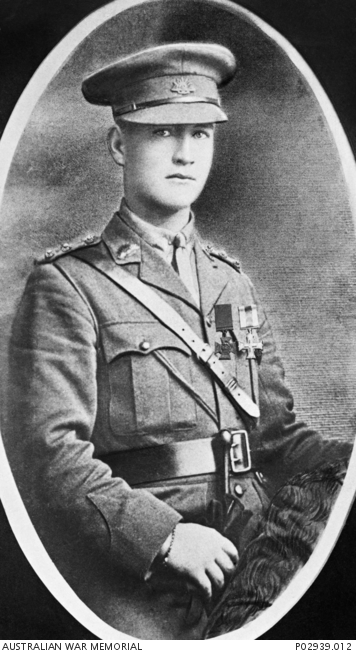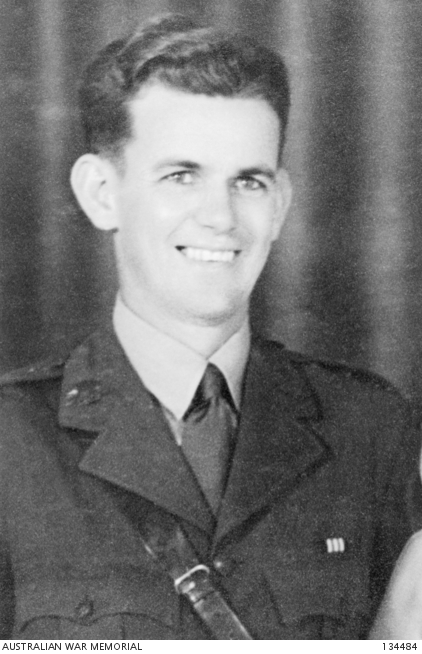
Captain Percy Cherry VC (1895-1917, 21yo)
Percy Herbert Cherry was born on 4 June 1895 at Drysdale, Victoria. Following his education, he found employment picking apples in Tasmania. He received a commission with the 93rd Infantry Regiment in 1913.
Cherry enlisted with the Australian Imperial Force on 15 March 1915 and joined the 26th Battalion. Military authorities deemed him too young for officer status, so he departed for Egypt holding the rank of Quartermaster Sergeant. At age 20 in August 1915, he advanced to Company Sergeant Major and served at Taylor’s Hollow and Russell’s Top during the Gallipoli campaign. December brought wounds and evacuation, though he returned within a week and gained promotion to Second Lieutenant.
Following machine-gun training in 1916, he transferred to the 7th Machine-Gun Battalion for French deployment. He led the company’s 1st Battery at Fleurbaix, Messines and during Somme operations until 05 August when he sustained injuries during combat with a German officer at Pozières. After exchanging sniper fire from their respective shell-holes, both officers discharged their weapons simultaneously, wounding each other with the German receiving fatal injuries. Cherry approached his opponent, who entrusted him with correspondence to post, uttering the final words ‘And so it ends’. Lieutenant rank followed on 25 August with Somme duty resumption in November; December brought temporary Captain status and transfer back to the 26th Battalion as Company Commander. Initially unpopular for being ‘a little martinet on parade’, he eventually earned his soldiers’ respect through battlefield leadership.
February 1917 confirmed Cherry's rank, and at Warlencourt on 1-2 March he participated in the Malt Trench assault. Upon discovering a small opening in enemy wire, he charged two machine-gun positions, single-handedly capturing one and redirecting the weapon against retreating Germans before sustaining wounds. His Military Cross recognition for this courageous act remained unannounced until his death, leaving him unaware of the honour. On 26 March 1917, his battalion received orders to capture Lagnicourt village. Cherry’s company faced determined resistance, and after all remaining officers became casualties, he ‘carried on with care and determination … and cleared the village of the enemy’. German counter-attacks sustained fighting throughout the day. Despite leg wounds, Cherry maintained his position until late afternoon when artillery fire killed him.
Cherry’s burial took place at Quéant Road cemetery, Buissy. He received a posthumous Victoria Cross, recommended by his Battalion Commander for ‘bravery beyond description’.

Sergeant Albert Chowne VC, MM (1920-1945, 24yo)
Albert Edward Chowne was born on 19 July 1920 in Sydney. Following his education, he secured employment as a shirt-cutter with David Jones while also representing the Gordon Rugby Union Football Club.
Chowne served briefly with the Militia’s 36th Battalion before enlisting in the Australian Imperial Force on 27 May 1940, joining the 2nd/13th Battalion. The battalion participated in garrisoning Tobruk and Libya during 1941, after which Chowne received assignment to a carrier platoon. September 1942 brought his promotion to Sergeant, and he sustained injuries at El Alamein in October 1942, requiring hospitalisation. The battalion’s return to Australia occurred in January 1943, with Papua deployment by July where Chowne had advanced to Mortar Platoon Sergeant. During late September operations near Finschhafen, New Guinea, he made two forward reconnaissance missions to coordinate mortar strikes against enemy installations, earning him the Military Medal. One comrade noted his ‘exceptional coolness and great courage’ and his modest nature, while another remembered that ‘he never showed fear’. February brought his return to Australia for officer preparation.
On 25 March 1945 in terrain south-west of Dagua, Chowne assaulted a Japanese-occupied hill that would subsequently bear his name. Climbing a steep, confined pathway, he deployed grenades and neutralised two machine-gun positions. Despite receiving fatal wounds, he advanced to the enemy foxholes and eliminated two additional soldiers before succumbing. His actions earned him a posthumous Victoria Cross.
Chowne’s interment took place at Lae war cemetery. His widow received his medals from the Governor-General in 1946 and donated them to the Australian War Memorial.
Last Reviewed 06/2025









